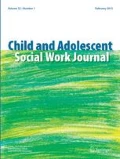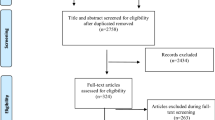Abstract
This systematic review sought to examine and synthesize empirical research on the association between early childhood (0–83 months) exposure to multiple adverse childhood experiences (ACEs) and the child’s social, behavioral, emotional, or physical developmental wellbeing. Guided by inclusion criteria and predefined search terms, articles were identified through electronic bibliographic databases, reference mining, hand searching, and gray literature. Two authors simultaneously conducted title and abstract reviews, and subsequently full-text reviews. Included studies examined early childhood exposure to two or more ACEs and the association between social, emotional, behavioral, physical, and/or overall wellbeing outcomes. Five studies met the predetermined inclusion criteria and were descriptive, secondary data analyses that utilized large, high-risk samples. Findings support a dose–response association between cumulative early childhood ACE exposure and behavioral issues and poor physical health outcomes. Results revealed between 12.3 and 70% of the early childhood samples were exposed to three or more ACEs. Among high-risk samples, exposure to multiple adversities is common although literature is scarce. Policy and practice implications include early assessments and interventions tailored to identifying the most vulnerable early childhood children.
Similar content being viewed by others
References
Achenbach, T. M., & Edelbrock, C. S. (1983). Manual for the child behavior checklist: And revised child behavior profile. Burlington: University of Vermont, Department of Psychiatry.
Bitsko, R. H., Holbrook, J. R., Kaminski, J. W., Ghandour, R., Smith, C., & Peacock, G. (2016). Health care, family, and community factors associated with mental, behavioral, and developmental disorders in early childhood—United States, 2011–2012. MMWR. Morbidity and Mortality Weekly Report. https://doi.org/10.15585/mmwr.mm6509a1.
Bloom, S. L. (2000). The neglect of neglect part 1. Psychotherapy Review, 2, 208–210.
Brown, D. W., Anda, R. F., Tiemeier, H., Felitti, V. J., Edwards, V. J., Croft, J. B., … Giles, W. H. (2009). Adverse childhood experiences and the risk of premature mortality. American Journal of Preventive Medicine, 37, 389–396.
Brown, S. M., & Shillington, A. M. (2017). Childhood adversity and the risk of substance use and delinquency: The role of protective adult relationships. Child Abuse & Neglect, 63, 211–221.
Burke, N. J., Hellman, J. L., Scott, B. G., Weems, C. F., & Carrion, V. G. (2011). The impact of adverse childhood experiences on an urban pediatric population. Child abuse & neglect, 35, 408–413.
Carlson, E. B., Furby, L., Armstrong, J., & Shlaes, J. (1997). A conceptual framework for the long-term psychological effects of traumatic childhood abuse. Child Maltreatment, 2, 272–295.
Center on the Developing Child at Harvard University (2007). The impact of early adversity on children’s development (InBreif). Retrieved from https://developingchild.harvard.edu/resources/inbrief-the-impact-of-early-adversity-on-childrens-development/.
Center on the Developing Child at Harvard University (2010). The foundations of lifelong health are built in early childhood. Retrieved from http://developingchild.harvard.edu/wp-content/uploads/2010/05/Foundations-of-Lifelong-Health.pdf.
Cooper, J. L., Masi, R., & Vick, J. (2009). Social-emotional development in early childhood: What every policymaker should know. National Center for Children in Poverty, Mailman School of Public Health, Columbia University. Retrieved from https://academiccommons.columbia.edu/catalog/ac:126269.
Cross, T., & Smith, K. (2010). The national survey of child and adolescent well-being: Tools for using longitudinal national study of children involved in maltreatment investigations. Portsmouth: Presented at the The International Family Violence and Child Victimization Research Conference.
D’Andrea, W., Ford, J., Stolbach, B., Spinazzola, J., & van der Kolk, B. A. (2012). Understanding interpersonal trauma in children: Why we need a developmentally appropriate trauma diagnosis. American Journal of Orthopsychiatry, 82, 187–200.
DeWalt, D. A., & Hink, A. (2009). Health literacy and child health outcomes: A systematic review of the literature. Pediatrics, 124(Supplement 3), S265–S274.
Dong, M., Anda, R. F., Felitti, V. J., Dube, S. R., Williamson, D. F., Thompson, T. J., … Giles, W. H. (2004). The interrelatedness of multiple forms of childhood abuse, neglect, and household dysfunction. Child Abuse & Neglect, 28, 771–784.
Dube, S. R., Anda, R. F., Felitti, V. J., Chapman, D. P., Williamson, D. F., & Giles, W. H. (2001). Childhood abuse, household dysfunction, and the risk of attempted suicide throughout the life span: Findings from the Adverse Childhood Experiences Study. Journal of the American Medical Association, 286, 3089–3096.
Dube, S. R., Anda, R. F., Felitti, V. J., Croft, J. B., Edwards, V. J., & Giles, W. H. (2001). Growing up with parental alcohol abuse: Exposure to childhood abuse, neglect, and household dysfunction. Child Abuse & Neglect, 25, 1627–1640. https://doi.org/10.1016/S0145-2134(01)00293-9.
Dube, S. R., Felitti, V. J., Dong, M., Chapman, D. P., Giles, W. H., & Anda, R. F. (2003). Childhood abuse, neglect, and household dysfunction and the risk of illicit drug use: The adverse childhood experiences study. Pediatrics, 111, 564–572. https://doi.org/10.1542/peds.111.3.564.
Dube, S. R., Felitti, V. J., Dong, M., Giles, W. H., & Anda, R. F. (2003). The impact of adverse childhood experiences on health problems: Evidence from four birth cohorts dating back to 1900. Preventive Medicine, 37, 268–277.
Edwards, V. J., Holden, G. W., Felitti, V. J., & Anda, R. F. (2003). Relationship between multiple forms of childhood maltreatment and adult mental health in community respondents: Results from the adverse childhood experiences study. American Journal of Psychiatry, 160, 1453–1460.
Enlow, M. B., Egeland, B., Blood, E. A., Wright, R. O., & Wright, R. J. (2012). Interpersonal trauma exposure and cognitive development in children to age 8 years: A longitudinal study. Journal of Epidemiology & Community Health. https://doi.org/10.1136/jech-2011-200727.
Fantuzzo, J. W., Rouse, H. L., McDermott, P. A., & Sekino, Y. (2005). Early childhood experiences and kindergarten success: A population-based study of a large urban setting. School Psychology Review, 34, 571.
Felitti, V. J., Anda, R. F., Nordenberg, D., Williamson, D. F., Spitz, A. M., Edwards, V., … Marks, J. S. (1998). Relationship of childhood abuse and household dysfunction to many of the leading causes of death in adults: The Adverse Childhood Experiences (ACE) Study. American Journal of Preventive Medicine, 14, 245–258.
Finkelhor, D., Ormrod, R., Turner, H., & Holt, M. (2009). Pathways to poly-victimization. Child Maltreatment, 14, 316–329.
Finkelhor, D., Ormrod, R. K., & Turner, H. A. (2007). Poly-victimization: A neglected component in child victimization. Child Abuse & Neglect, 31, 7–26. https://doi.org/10.1016/j.chiabu.2006.06.008.
Fiscella, K., & Kitzman, H. (2009). Disparities in academic achievement and health: The intersection of child education and health policy. Pediatrics, 123, 1073–1080.
Flaherty, E. G., Thompson, R., Litrownik, A. J., Theodore, A., English, D. J., Black, M. M., … Dubowitz, H. (2006). Effect of early childhood adversity on child health. Archives of Pediatrics & Adolescent Medicine, 160, 1232–1238. https://doi.org/10.1001/archpedi.160.12.1232.
Ford, J. D. (2013). Trauma exposure and posttraumatic stress disorder in the lives of adolescents. Journal of the American Academy of Child & Adolescent Psychiatry, 52, 780–783. https://doi.org/10.1016/j.jaac.2013.05.012.
Freeman, P. A. C. (2014). Prevalence and relationship between adverse childhood experiences and child behavior among young children. Infant Mental Health Journal, 35, 544–554. https://doi.org/10.1002/imhj.21460.
Gerhardt, S. (2006). Why love matters: How affection shapes a baby’s brain. Infant Observation, 9, 305–309.
Grasso, D. J., Dierkhising, C. B., Branson, C. E., Ford, J. D., & Lee, R. (2016). Developmental patterns of adverse childhood experiences and current symptoms and impairment in youth referred for trauma-specific services. Journal of Abnormal Child Psychology, 44(5), 871–886. https://doi.org/10.1007/s10802-015-0086-8.
Herman, D. B., Susser, E. S., Struening, E. L., & Link, B. L. (1997). Adverse childhood experiences: Are they risk factors for adult homelessness? American journal of public health, 87, 249–255.
Hillis, S. D., Anda, R. F., Felitti, V. J., & Marchbanks, P. A. (2001). Adverse childhood experiences and sexual risk behaviors in women: A retrospective cohort study. Family Planning Perspectives, 206–211.
Irwin, L. G., Siddiqi, A., & Hertzman, C. (2007). Early child development: A powerful equalizer. Vancouver, BC: Human Early Learning Partnership (HELP) Retrieved from https://pdfs.semanticscholar.org/1df8/62d6976456b057e8ce78c9e713807e7590d0.pdf.</bib>
Jimenez, M. E., Wade, R. Jr., Lin, Y., Morrow, L. M., & Reichman, N. E. (2016). Adverse experiences in early childhood and kindergarten outcomes. Pediatrics, 137, e20151839. https://doi.org/10.1542/peds.2015-1839.
Kalmakis, K. A., & Chandler, G. E. (2014). Adverse childhood experiences: Towards a clear conceptual meaning. Journal of Advanced Nursing, 70, 1489–1501.
Keiley, M. K., Howe, T. R., Dodge, K. A., Bates, J. E., & Pettit, G. S. (2001). The timing of child physical maltreatment: A cross-domain growth analysis of impact on adolescent externalizing and internalizing problems. Development and Psychopathology, 13, 891–912.
Kerker, B. D., Zhang, J., Nadeem, E., Stein, R. E. K., Hurlburt, M. S., Heneghan, A., … Horwitz, S. M. (2015). Adverse childhood experiences and mental health, chronic medical conditions, and development in young children. Academic Pediatrics, 15, 510–517.
Kessler, R. C., Andrews, G., Mroczek, D., Ustun, B., & Wittchen, H.-U. (1998). The World Health Organization composite international diagnostic interview short-form (CIDI-SF). International Journal of Methods in Psychiatric Research, 7, 171–185.
Larkin, H., Felitti, V. J., & Anda, R. F. (2014). Social work and adverse childhood experiences research: Implications for practice and health policy. Social Work in Public Health, 29, 1–16. https://doi.org/10.1080/19371918.2011.619433.
Littell, J. H., Corcoran, J., & Pillai, V. (2008). Systematic reviews and meta-analysis. Oxford: Oxford University Press.
Lupien, S. J., McEwen, B. S., Gunnar, M. R., & Heim, C. (2009). Effects of stress throughout the lifespan on the brain, behaviour and cognition. Nature Reviews Neuroscience, 10, 434–445. https://doi.org/10.1038/nrn2639.
McGee, R. A., Wolfe, D. A., Yuen, S. A., Wilson, S. K., & Carnochan, J. (1995). The measurement of maltreatment: A comparison of approaches. Child Abuse & Neglect, 19, 233–249
Middlebrooks, J. S., & Audage, N. C. (2008). The effects of childhood stress on health across the lifespan. Centers for Disease Control and Prevention, National Center for Injury Prevention and Control. Retrieved from http://health-equity.lib.umd.edu/932/1/Childhood_Stress.pdf.
Ney, P. G., Fung, T., & Wickett, A. R. (1994). The worst combinations of child abuse and neglect. Child Abuse & Neglect, 18, 705–714
Phillips, D. A., & Shonkoff, J. P. (2000). From neurons to neighborhoods: The science of early childhood development. National Academies Press.
Reichman, N. E., Teitler, J. O., Garfinkel, I., & McLanahan, S. S. (2001). Fragile families: Sample and design. Children and Youth Services Review, 23, 303–326.
Sabri, B., Hong, J. S., Campbell, J. C., & Cho, H. (2013). Understanding children and adolescents’ victimizations at multiple levels: An ecological review of the literature. Journal of Social Service Research, 39, 322–334.
Shonkoff, J. P. (2010). Building a new biodevelopmental framework to guide the future of early childhood policy. Child Development, 81(1), 357–367. https://doi.org/10.1111/j.1467-8624.2009.01399.x.
Stein, R. E. K., Hurlburt, M. S., Heneghan, A. M., Zhang, J., Rolls-Reutz, J., Silver, E. J., … Horwitz, S. M. (2013). Chronic conditions among children investigated by child welfare: A national sample. Pediatrics, 131, 455–462. https://doi.org/10.1542/peds.2012-1774.
Steinberg, A. M., Pynoos, R. S., Briggs, E. C., Gerrity, E. T., Layne, C. M., Vivrette, R. L., … Fairbank, J. A. (2014). The national child traumatic stress network core data set: Emerging findings, future directions, and implications for theory, research, practice, and policy. Psychological Trauma: Theory, Research, Practice, and Policy, 6(S1), S50.
Straus, M. A. (1979). Measuring intrafamily conflict and violence: The conflict tactics (CT) scales. Journal of Marriage and the Family, 41, 75–88.
Straus, M. A., Hamby, S. L., Boney-McCoy, S., & Sugarman, D. B. (1996). The revised conflict tactics scales (CTS2) development and preliminary psychometric data. Journal of Family Issues, 17, 283–316.
Straus, M. A., Hamby, S. L., Finkelhor, D., Moore, D. W., & Runyan, D. (1998). Identification of child maltreatment with the Parent-Child Conflict Tactics Scales: Development and psychometric data for a national sample of American parents. Child Abuse & Neglect, 22, 249–270.
U.S. Department of Health and Human Services Administration for Children and Families. (n.d.). National survey of child and adolescent well-being (NSCAW), 1997-2014 and 2015-2022. Retrieved from https://www.acf.hhs.gov/opre/research/project/national-survey-of-child-and-adolescent-well-being-nscaw.
Yoshikawa, H. (2010). The foundations of lifelong health are built in early childhood. Cambridge, MA: Harvard Center on the Developing Child. Retrieved from http://developingchild.harvard.edu/wp-content/uploads/2010/05/Foundations-of-Lifelong-Health.pdf.
Author information
Authors and Affiliations
Corresponding author
Ethics declarations
Conflict of interest
Kiley Liming and Whitney Grube declare that they have no conflicts of interest.
Rights and permissions
About this article
Cite this article
Liming, K.W., Grube, W.A. Wellbeing Outcomes for Children Exposed to Multiple Adverse Experiences in Early Childhood: A Systematic Review. Child Adolesc Soc Work J 35, 317–335 (2018). https://doi.org/10.1007/s10560-018-0532-x
Published:
Issue Date:
DOI: https://doi.org/10.1007/s10560-018-0532-x




